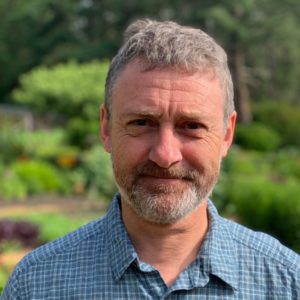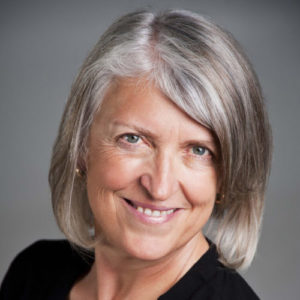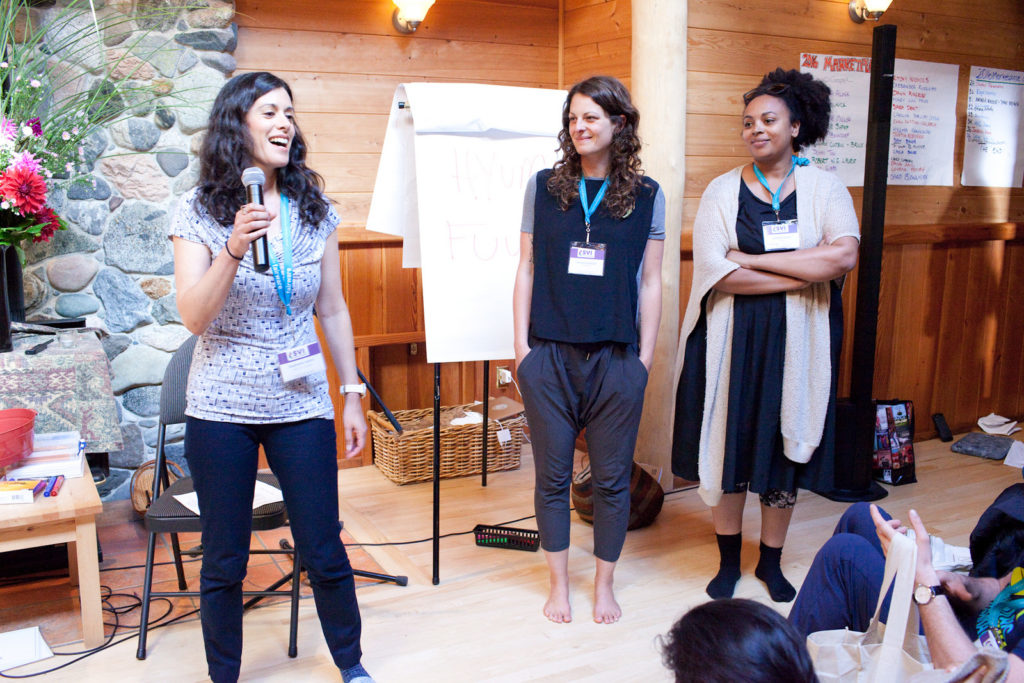Advanced Facilitation: Cultural Fluency & Collaboration (Vancouver)
With Julian Griggs, Michelle LeBaron and Joenita Paulrajan, PhD
June 16 - 18, 2021
Sign-up to be notified when registration opens for this 2021 program.
fa·cil·i·ta·tion
/fəˌsiləˈtāSH(ə)n/
What does ‘group facilitation’ mean to you?
For some, group facilitation means the deployment of an established suite of process tools, grounded in the experience of a ‘neutral’ professional, and delivered as a service to enable groups to operate at their very best. From this perspective, the primary job of a facilitator is to support constructive dialogue, help groups engage across difference, and manage conflict. This version of facilitation places emphasis on analysis, careful agenda design, and multiple ways of nurturing collaboration.
For others, facilitation connotes something much broader. From this second vantage point, facilitation is about bridge building and strengthening relationships, informed by a core set of values-in-action related to empowerment, shared learning and reconciliation. This version of facilitation includes a deeper dive into underlying group dynamics and their contexts, both immediate and broader. This second approach assumes that, while many conventional tools may be needed, additional strategies will be required to engage with uncertainty and complexity and to navigate and manage conflict. These strategies include not only analytic and creative/expressive arts tools, but also the willingness to question the implicit assumptions incorporated in conventional approaches.
In practice, a blend of these two approaches informs and animates the work of many group facilitators. Whatever the approach, individuals who take on this role have many choices, some conscious and some beneath awareness. At many points in their relationships with a group, decisions are made regarding the style of facilitation used, the tools and approaches employed, and the scope of the facilitation role. These decisions always apply implicit theories of change; effective advanced practitioners adopt habits of examining their implicit theories and theories in use to be sure their work is as inclusive and resonant as possible.
In this Advanced Group Facilitation program, three seasoned practitioners draw on decades of facilitation and conflict transformation experience to explore questions including:
- How does the background, cultural identity and social location of the facilitator influence their role and shape how the group engages? How does the ‘who’ of a facilitator affect effective practice?
- How can facilitators effectively navigate dynamics related to power, identity and privilege?
- When a carefully-constructed agenda is not working, which tools for innovation can be employed? How can facility with these resources be cultivated?
- In the midst of uncertainty and complexity, how can facilitators increase their capacities to improvise?
- What can be done to support groups at impasse?
- How can facilitators cope with heated conflict, or sudden escalations?
- How does somatic intelligence help facilitators improve their practice? How can this and other complementary ways of working be acquired and honed?
- What is the role of intuition in facilitation, and how can facilitators increase their intuitive capacities?
- Which resources do facilitators have for addressing secondary trauma—their own and others’?
- When and how can creative and expressive arts-based activities be integrated into facilitation practice, and how can scepticism or resistance to these approaches be overcome?
- How can facilitators foster a sense of belonging and inclusion for all group members?
- How can facilitators recognize bias and mitigate its impact on a group?
- How can facilitators prepare to work in a racially diverse context with racially diverse groups?
- Which practices, awarenesses and habits of mind foster successful co-facilitation?
Situating the group facilitator as a change agent, this 3-day program offers a shared learning space where participants can explore the strengths and limitations of conventional facilitation approaches. We will challenge assumptions related to ‘neutrality’ and examine our implicit theories of change as to whom they include or exclude. Building recent research on collaboration, neuroscience, and leadership, participants will strengthen core capacities including cultural fluency, intuition, and presence. We will explore challenges that confront facilitators at different stages of facilitation—during preparation, in the midst of one or more facilitated events, and in the aftermath. Throughout the program, participants will receive coaching and support from the course leaders and from colleague peers as they apply new tools and insights to reflect on their facilitation practices, whether in hindsight or as part of their preparations for upcoming projects.
This program is intended for individuals with an established facilitation practice who have considerable experience. Previous attendance at relevant training programs—in facilitation, conflict resolution, or intercultural communication—would also be an asset.
About the Presenters

Julian Griggs
Julian Griggs is one of the Founding Principals of the Dovetail Consulting Group based in Vancouver, BC and has more than 25 years’ experience as a facilitator, trainer and management consultant. Julian has worked with conservation groups, First Nations, the philanthropic sector, all levels of government, industry and communities in Canada, in the western US […]
Learn more about Julian Griggs
Michelle LeBaron
Michelle LeBaron is an internationally-recognized conflict engagement specialist whose work is animated by creativity, culture and interdisciplinarity. A tenured professor of law, she has done seminal work in many types of conflict engagement including intercultural, international, family, organizational and commercial. Michelle’s current research focuses on dialogic approaches to political and religious conflict, and on how […]
Learn more about Michelle LeBaronCategories : June, Leadership Skills, Professional Training, Social Innovation, Vancouver

